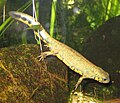Fire belly newt
| Fire belly newts | |
|---|---|

| |
| Scientific classification | |
| Domain: | Eukaryota |
| Kingdom: | Animalia |
| Phylum: | Chordata |
| Class: | Amphibia |
| Order: | Urodela |
| Family: | Salamandridae |
| Subfamily: | Pleurodelinae |
| Genus: | Cynops Tschudi, 1839 |
The fire belly newt or fire newt is a genus (Cynops) of newts native to Japan and China. All of the species show bright yellow or red bellies, but this feature is not unique to this genus. Their skin contains a toxin that can be harmful if ingested.
Species
Species recognized as of October 2019:[1]
| Image | Scientific name | Common Name | Distribution |
|---|---|---|---|
| Cynops chenggongensis Kou and Xing, 1983 | Chenggong fire belly newt* | Chenggong District of Yunnan | |
 |
Cynops cyanurus Liu, Hu, and Yang, 1962 | Chuxiong fire-bellied newt or blue-tailed fire belly newt* | Guizhou and Yunnan |
 |
Cynops ensicauda (Hallowell, 1861) | Okinawan sword-tail newt | Ryukyu Archipelago in Japan |
| Cynops fudingensis Wu, Wang, Jiang, and Hanken, 2010 | Fuding fire belly newt* | Fuding in northeastern Fujian, China | |
| Cynops glaucus Yuan, Jiang, Ding, Zhang, and Che, 2013 | Guangdong, China | ||
 |
Cynops orientalis (David, 1873) | Chinese fire belly newt* | China |
| Cynops orphicus Risch, 1983 | Dayang newt or Dayang fire belly newt* | Jiexi County in eastern Guangdong | |
 |
Cynops pyrrhogaster (Boie, 1826) | Japanese fire belly newt | Japan |
 |
Cynops wolterstorffi (Boulenger, 1905) | Yunnan lake newt* | Yunnan, China |
| Cynops yunnanensis Yang, 1983 | Yunnan, China |
(A * means that the newt has been moved into the genus Hypselotriton in some classifications [2][3])
Taxonomic controversy
The genus Cynops has been suggested to be due for a split, with the Chinese species being placed in a separate genus from the Japanese ones.[4] The species Cynops cyanurus is at the centre of all this. There is much debate about the validity of C. cyanurus and C. chenggongensis. All the known captive animals could be something different from C. cyanurus, as they do not entirely match the original description of the species. [citation needed] The only known animals that match that are animals originating from Chemnitz Zoo, but the F2 animals have not bred well, which could suggest they are in fact a hybrid of C. cyanurus and C. chenggongensis or an undescribed Cynops species. [citation needed]
References
- ^ Frost, Darrel R. (2019). "Cynops". Amphibian Species of the World: an Online Reference. Version 6.0. American Museum of Natural History, New York, USA. Retrieved 11 October 2019.
- ^ "From Cynops to Hypselotriton - when did this happen? - Caudata.org Newt and Salamander Forum". www.caudata.org. Archived from the original on 2013-06-27.
- ^ "Revision of salamandrid taxonomy - Caudata.org Newt and Salamander Forum". www.caudata.org. Archived from the original on 2010-09-13.
- ^ Chan, L. M.; Zamudio, K. R.; Wake, D. B. (2001). "Relationships of the salamandrid genera Paramesotriton, Pachytriton, and Cynops based on mitochondrial DNA sequences" (PDF). Copeia. 2001 (4): 997–1009. doi:10.1643/0045-8511(2001)001[0997:rotsgp]2.0.co;2. JSTOR 1448388.
External links
![]() Media related to Cynops at Wikimedia Commons
Media related to Cynops at Wikimedia Commons
